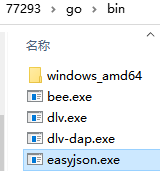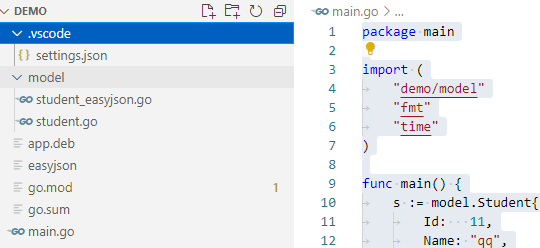Go easyjson使用
周伯通 人气:0如果使用go语言自带的json库,使用的是反射,而go语言中反射性能较低。easyjson就是一个比较好的替代方案。
esayjson安装(https://gitcode.net/mirrors/mailru/easyjson?utm_source=csdn_github_accelerator)
go get -u github.com/mailru/easyjson go install github.com/mailru/easyjson/easyjsonorgo go build -o easyjson github.com/mailru/easyjson/easyjson(这里默认在当前目录生成easyjson二进制可执行文件)
安装easyjson
# for Go < 1.17 go get -u github.com/mailru/easyjson/... # for Go >= 1.17 go get github.com/mailru/easyjson && go install github.com/mailru/easyjson/...@latest
说下我的环境:win10,go1.18,如下图

安装完毕后,GOPATH里bin下就有easyjson.exe。
使用go env 查看如我的gopath为:C:\Users\77293\go

使用easyjson
go mod init demo
比如我的当前工作目录demo下初始化mod,创建一个文件夹model,在model下新建student.go文件:
定义结构体:
记得在需要使用easyjson的结构体上加上//model:json 标注。 此处model是我的包路径名即为model,代码如下:
package model
import "time"
//model:json
type School struct {
Name string `json:"name"`
Addr string `json:"addr"`
}
type Student struct {
Id int `json:"id"`
Name string `json:"s_name"`
School School `json:"s_chool"`
Birthday time.Time `json:"birthday"`可以进入结构体包model下执行:
easyjson -all student.go
运行完后,该文件夹中有一个student_easyjson.go,该文件中就是easyjson帮我们生成的MarshalJSON和UnmarshalJSON方法.

使用示例
package main
import (
"demo/model"
"fmt"
"time"
)
func main() {
s := model.Student{
Id: 11,
Name: "qq",
School: model.School{
Name: "CUMT",
Addr: "xz",
},
Birthday: time.Now(),
}
bt, err := s.MarshalJSON() // MarshalJSON
fmt.Println(string(bt), err)
json := `{"id":1,"s_name":"克莱尔","s_chool":{"name":"中南","addr":"wuhan"},"birthday":"2003-08-04T20:58:07.9894603+08:00"}`
str := model.Student{}
str.UnmarshalJSON([]byte(json)) // UnmarshalJSON
fmt.Println(str)
}运行结果:
{"id":11,"s_name":"qq","s_chool":{"name":"CUMT","addr":"xz"},"birthday":"2022-04-17T20:48:07.9274949+08:00"} <nil>
{1 克莱尔 {中南 wuhan} 2003-08-04 20:58:07.9894603 +0800 CST
小结:go自带JSON库使用的反射原理,性能相对较差,可以使用easyjson代替。
加载全部内容